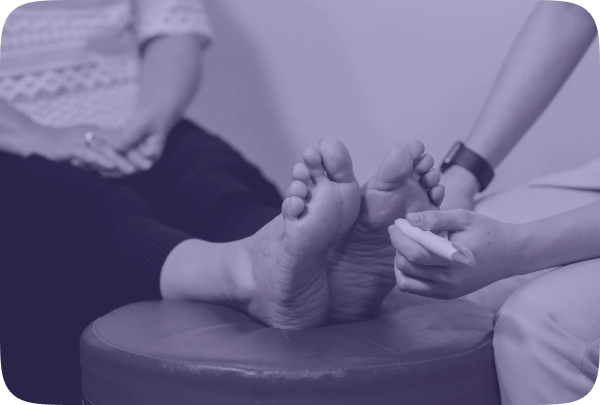Neuropathic pain or peripheral neuropathy is among the leading causes of chronic pain in the U.S. According to the American Chronic Pain Association, it affects up to 10% of the population. Depending on the cause, neuropathic pain can be reversed or managed with proper treatment.


.svg)
Peripheral neuropathy affects the network of nerves that facilitate communication between the spinal cord, the brain, and the rest of the body. This network is called the peripheral nervous system. Any disease that causes nerve damage in the peripheral nervous system falls under the umbrella term of peripheral neuropathy.
There are four main types of peripheral neuropathy:
Multifocal motor neuropathy (MMN) affects the motor nerves, which are the nerves that control the muscles. Patients with MMN suffer from weak, twitching, or cramping muscles because their motor nerves are being attacked by their immune systems.
Sensory neuropathy affects the nerves associated with the sense of touch, including temperature and pain.
The autonomic nerves control unconscious actions, such as breathing and digestion. Autonomic nerve neuropathy is a severe condition.
Combination neuropathies, such as sensory-motor neuropathy, affect multiple parts of your nervous system.
In the U.S., the most common cause of peripheral neuropathy is diabetes. Other diseases and medical conditions that can lead to peripheral neuropathy include:
Peripheral neuropathy can also result from infections, injuries, vitamin deficiencies, alcoholism, poor dietary choices, and chemotherapy medications.
In some instances, the condition may be reversible once the cause is resolved.
Request an appointment.webp)


There are over 100 types of peripheral neuropathy. The symptoms vary widely, depending on which nerves are affected and many other factors.

As the motor nerves deteriorate, patients can experience muscle weakness and difficulty moving. In addition, the lack of nerve connection may cause muscle atrophy or muscle shrinkage.
Muscle atrophy is especially common in the feet, lower legs, and hands. Lastly, patients with motor neuropathy may experience uncontrolled movements, such as muscle twitching or painful cramps caused by hyperactive contractions.
Sensory neuropathy disrupts how the senses communicate information from the outside world to the brain.
One common symptom is a tingling sensation — almost like radio static — that keeps messages from coming through clearly. In addition, when the nerves struggle to send or relay signals, patients may experience a loss of sensation, numbness, or tingling that overrides other feelings in the skin.
The misfires in the sensory nervous system caused by neuropathy can also lead to imbalance, clumsiness, and spontaneous or overly intense nerve pain.


The body’s autonomic processes, such as sweating, breathing, and digestion, occur without awareness. The autonomic nerves carry those signals, and when they become damaged, these processes suffer.
Symptoms of autonomic neuropathy include sudden blood pressure changes and too much or too little sweating, which leads to issues managing internal body temperature.
In addition, autonomic neuropathy can cause bowel and bladder issues, such as constipation, diarrhea, or loss of bladder control. The autonomic nervous system also controls sexual arousal, so patients with autonomic neuropathy can experience sexual dysfunction.
.svg)
Some causes of peripheral neuropathy, such as vitamin deficiencies, are preventable. Those who are more susceptible to developing peripheral neuropathy can lower the chances or delay the development of the condition by taking these precautionary steps:
.svg)
.svg)
.svg)
.svg)
.svg)
.svg)
Finally, proper treatment under the guidance of a skilled neurologist can help you manage or even recover from peripheral neuropathy.

